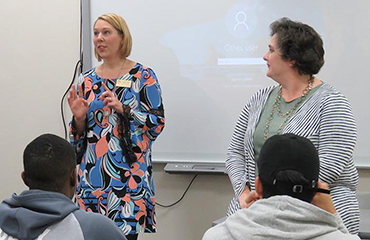
On the morning of Aug. 21, 2017, Lander University freshman Cynthia Graham sat in Finis Horne arena composing a lightning-fast email to math professor Gina Dunn.
It didn't matter that Dunn was standing just a few feet in front of her, delivering a convocation speech - Graham was trying to outrace every other freshman to be the first one to send her message.
She was hoping to win an on-the-spot contest to guess Dunn's age - something Dunn had challenged all attending freshmen to do by piecing together several clues in her speech.
Graham not only placed first among 21 winners of Dunn's challenge, she and all 40 freshmen responders had just taken their first official assignment in a new course known as LINK 101.
Implemented during the 2017 fall semester to help new students transition more easily from high school to college, LINK 101's primary purpose is to keep more freshmen connected to school - and so far, that purpose is working.
"There is such a difference between going to high school and going to college," Dunn said. "And we think if this premise is constantly reinforced, and we aid students in their journey in their freshman year, they will continue with their studies in their sophomore year."
In its first semester, Link 101 began with 766 freshmen.
So far, the new course has included instruction in university networking, training in leadership, professional development, and connecting freshmen to other people in their major to help them succeed for both the short- and long-term.
"All students entering Lander with 24 or fewer college credit hours are required to take LINK 101 in their first semester," said Mark Pilgrim, associate professor of Biology and director of the LINK program.
Weekly classes have centered on student health, career exploration, financial managing, student conduct and honor code, academic success and campus resources.
Campus posters reinforce the importance of freshmen maintaining a 3.0 GPA with 30 completed semester hours to keep their Life Scholarship.
And students such as Angelina Gargano are becoming connected to Lander by learning some of its more recent history.
"I would not have learned that the front fountain is fairly new," said Gargano, another of Dunn's contest winners.
Freshmen Macy Sinner added, "Once you find people and groups that you fit in with, it becomes easier to enjoy college life and reduces the chances of an individual wanting to leave those connections they made."
And Graham, who had enough credit hours to become exempt from the new course, said that the contest was a great way to launch the LINK 101 program.
"And I won a membership to the Student Alumni Association," she said.
But Dunn and other Lander educators are hoping LINK 101 will, in the long run, help accomplish a bigger purpose: to keep more freshmen in school.
Based on reports by the National Student Clearinghouse Research Center in Herndon, Va., which provides educational reporting, data exchange, verification, and research services, 18 percent of students who started college at a public 4-year institution are not enrolled in college anywhere one year later.
"Getting past the first year is one of the most important milestones to a college degree," said Dr. Doug Shapiro, executive research director for the center. "Yet, many students are not returning for their second year - and, for too many of those, the option of finding a better fit at a different college seems to be narrowing."
Since 2010, the freshman retention rate at Lander has fluctuated between 62 percent and 70 percent.
This means that for every 10 students who enter Lander as freshmen, approximately seven remain in school, while three leave.
"Our goal with first-year to second-year retention is to be between 74 percent and 77 percent," said Brian Hamm, assistant vice president for Enrollment and Student Success. "LINK 101 along with other initiatives on campus serve to help successfully guide students through this pivotal transition period."
Now, heading into its second semester, Link 101 appears to be heading in that direction.
"It sets the entire foundation for the next three years that will follow," Sinner said.
Dunn added, "We keep reminding our freshmen that they need to be involved on campus, need to seek support. And we're in constant contact with them."